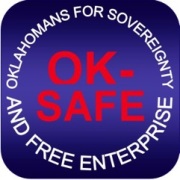OK-SAFE, Inc. – After almost a two month delay, the Joint Legislative Committee on Federal Health Care Reform has finally released it’s final report, 3 weeks after the start of OK legislative session.
The Governor and Leadership had seen the committee report much earlier, and legislation implementing the committee’s findings has already been planned and reserved.
No Big Surprises
The Legislature’s February 22, 2012 press release contained no big surprises, especially for those who have been following this state’s years-long implementation of health care reform, via both the HITECH Act of 2009 and PPACA (“Obama Care”).
There was no real surprise either, when yesterday (2/21/12) it was confirmed that SB 1116, a bill to repeal the title of law that created the Oklahoma Health Information Exchange Trust (OHIET), would not get a hearing in the Senate.
The Senate Leadership, and it’s author Sen. Brian Crain, made sure the bill would not get heard.
February 22, 2012 Press Release Excerpt:
“The committee’s final report (attached) recommends that Oklahoma: Continue to fight the federal health care law in court; better educate the public about ways to improve their health; prepare for a dramatic expansion of Medicaid eligibility due to PPACA; begin developing a market-based state health insurance exchange in order to prevent imposition of a federal exchange in Oklahoma; form a permanent legislative committee to monitor issues related to the federal health care law; and increase medical residency programs in order to address current and future doctor shortages – particularly in rural areas.
What the committee is not mentioning here is the fact the work to align Oklahoma with all the technology provisions of both the HITECH Act of 2009, and the PPACA, has already been started, facilitated by legislation creating electronic health records, and by the creation of a public trust called the Oklahoma Health Information Exchange Trust, or OHIET. If the state builds an exchange, it may say OKLAHOMA (Insure Oklahoma) on the outside, but the inside functionality, and IT standards, will be all federally compliant and interoperable.
The release continues:
“Regarding health insurance exchanges, the report recommends Oklahoma begin taking steps to implement a state-based, free market health insurance exchange. The recommended exchange is similar to the one in development by the state of Utah since before PPACA’s existence. Utah’s exchange model was recommended to the committee by U.S. Sen. Tom Coburn. The recommended Oklahoma exchange would be housed in Insure Oklahoma, which would be spun off from the Oklahoma Health Care Authority and turned into a public trust.”
Besides pointing out the clear contradiction in the statement “state-based, free market health insurance exchange”, (you can’t have both state involvement AND be free-market), this release just confirms the state of Oklahoma, under Republican leadership, is ready to implement a federally compliant exchange, while giving the appearance of fighting “Obama Care”.
Another Trust?
The OHIET is a public-beneficiary trust that was created by stealth in the last week of May 2010. It is responsible for the implementation of the technology infrastructure in this state that makes “Obama Care” work, establishing the ‘network of networks’ linking the patient (that’s you), the providers, and the payers. The OHIET operates with no legislative oversight, and as the State Designated Entity (SDE), they can solicit and receive federal grants, award contracts, issue bonds, and incur debt.
In fact, due to timeline extensions by the HHS they could end up soliciting the very same $54M Early Innovator Grant that Gov. Fallin “rejected” in the spring of 2011.
The OHIET is currently using federal grant money to operate (see the Challenge Grant), and are busy awarding each other contracts for health information exchange.
The OHIET trust model was drafted by the law firm Crowe and Dunlevy. One assumes that this same firm has had a hand in drafting the proposed insurance exchange trust language, transforming Insure Oklahoma into an insurance exchange.
It is virtually impossible to terminate a trust; there has to be political will in the Legislature anyway to make to make it happen. The Oklahoma legislature, under Republican Governor Mary Fallin, does not want to stop the implementation of health care reform, aka “Obama Care.”
Instead, the Republican-led OK Legislature wants to keep on doing what they’ve been doing – implementing “Obama Care” while giving the appearance of opposing “Obama Care.”
It’s an election year – time to flip some Houses.
Both Committee Chairs – Sen. Gary Stanislawski and Rep. Glen Mulready have indicated they would not have supported SB 1116, saying they prefer a patient “opt-in/out” option. This, of course, would leave the OHIET, and it’s agenda, intact.
February 22, 2012 Press Release in it’s entirety is available here.
The Final Report of the Joint Committee on Health Care Law is available here.





